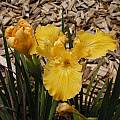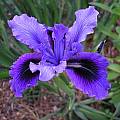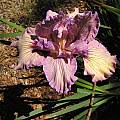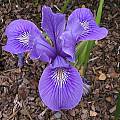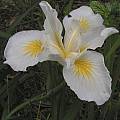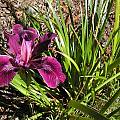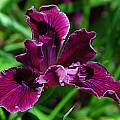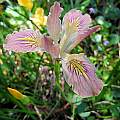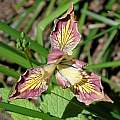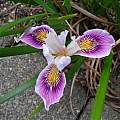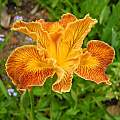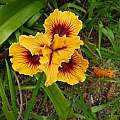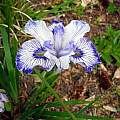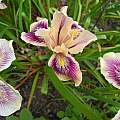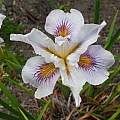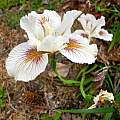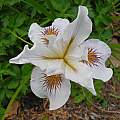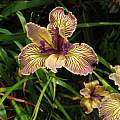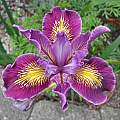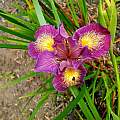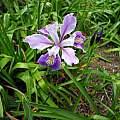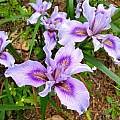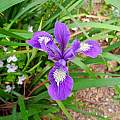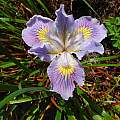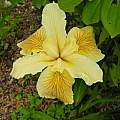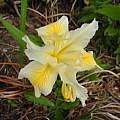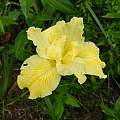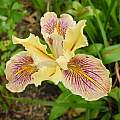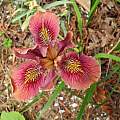Pacific Coast Irises (Pacificas) hybridize easily, and natural hybrids are common where two or more species overlap in distribution. Pacific Coast Hybrids is the name used for some of the hybrids. In the garden, more than fifty generations of selection have produced dazzling colors, signals and venation patterns, wide petals, ruffly petals, and other changes. The Society for Pacific Coast Native Iris's website has sections on growing, hybridizing, seed starting and other topics. There are photos pictured below grown from its (SPCNI) seed exchange.
Below are pictures taken by Bob Rutemoeller of some of them. The first is called 'Big Smile'.
Photos by Mary Sue Ittner of selections from a friend who grew them from seed. The one pictured in photos 3-4 has been very successful in her garden, blooming every year.
Below are pictured natural hybrids from Mary Sue Ittner of hybrids that occurred in her garden, probably between Iris douglasiana and Iris innominata since the flower is in the middle of a patch of the latter and I have a lot of the former growing in my garden. These two species are often used in hybridizing the Pacific Coast hybrids.
Kathleen Sayce is growing a lot of hybrids in her Washington garden. Below are a representative of some of the ones blooming May 2016 photographed by Mary Sue Ittner. Photo 1 is an older Iris douglasiana selection that will be registered under the name 'Cape Sebastian'. Photo 2 is a Joe Ghio hybrid named 'Wildman'; he has registered several hybrids in this format, including 'Rodeo Gulch', which is very similar but has a neon purple signal instead of a red signal. Photo 3 is a Joe Ghio hybrid named 'Cozumel', with abundant veining on falls and standards. Photo 4 is a Joe Ghio hybrid named 'Finger Pointing'. Photo 5 is PCI 'Edgeworthy', a hybrid developed by Emma Elliott at Wild Ginger Farms. Flower backgrounds start out creamy and fade to white as the flowers mature.
Photos 1-3 are hybrids from Richard Richards, as yet unregistered, and which have Iris hartwegii ssp. australis genes; Richard breeds for toughness in surviving droughts and heat. Iris hartwegii ssp. australis lives above 5,000 ft in the mountains near Los Angeles, and appears to confer resistance to winter wet as well as summer heat.
Photo 1 is an open pollinated seedling of PCI 'Untitled' via the SPCNI seed exchange; this plant looks very like the named pod parent. Photo 2-3 are open pollinated seedlings of PCI 'Gold Dusted' via the SPCNI seed exchange; the veining on the falls hints at the named pod parent. Photo 4 is a seedling from pod parent PCI 'Valley Banner', showing modified traits from this parent in dark falls, light standards and style arms. Photo 5 is an unregistered selection from Joy Creek Nursery, informally named JC Orchid. Photo 6 an Iris douglasiana x Iris tenax cross, unnamed, with good flower form on a sturdy plant
Photos 1-2 are open pollinated seedlings from a mixed lot of seeds from Debby Cole via the SPCNI seed exchange. Kathleen is growing the second one on and may share it with others to evaluate. Its genes are unknown, but it clearly has many traits of modern hybrids, with wide, slightly ruffled petals, a faint blue mark on the signals when first opening, and nicely veined falls. Plants are moderately vigorous, but not very compact, another trait of many hybrids. Photos 3-5 are seedlings from a "tall yellow" seed mix, from the SPCNI seed exchange. The last photo is another seedling grown from seed from the SPCNI seed exchange, but the source is unknown since the tag is gone, no doubt removed by chipmunks or jays.
Iris Index - Beardless iris A-K - Beardless iris L-R - Beardless iris S-Z - Crested Irises - Garden Bearded Irises - Juno iris A-I - Juno iris J-R - Juno iris S-Z - Aril Irises - Miscellaneous Irises - Pacific Coast Irises - Reticulata Irises - Spanish Irises - Belamcanda - Hermodactylus - Pardanthopsis
